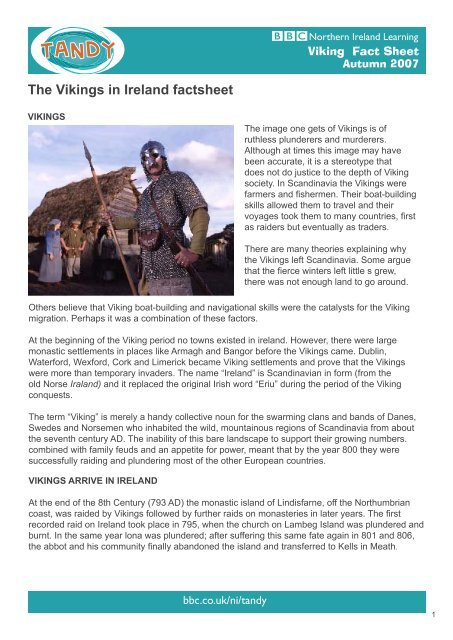The British Isles - Vikings 793 AD Mac OS
– The Anglo-Saxon Chronicle 793 AD. Like the Saxons, the Vikings – Norsemen from what is now modern Sweden, Norway and Denmark – initially came as raiders. But, also like the Saxons, recognising what a jolly fine place Britain was, many of them wanted to settle down and grow pigs and so forth. Focusing on key events, including the sack of Lindisfarne in 793 and the Battle of Stamford Bridge in 1066, medieval history expert John Haywood recounts the saga of the Viking Age, from the creation of the world through to the dwindling years of halfhearted.
Northumberland The 8th of June 793 AD. The Norse raid on the holy island of Lindisfarne on June 8th 793 shocked a people, and gave warning of future clashes with the warrior-bandits from across the North Sea. The portents were there for some time before June 8th: terrible storms, immense sheets of lightning, fiery dragons even according to the Anglo- Saxon Chronicles.

The Battle of Clontarf was the culmination of hundreds of years of animosity and hostility between the Celts in Ireland and the Viking invaders on the Island. The Battle also became the greatest show of strength between the two factions and effectively ended the Viking dominance in Ireland.
The British Isles - Vikings 793 Ad Mac Os Download
According to author Gwyn Jones: “Clontarf… was too important to be left to historians, so passed into the legend maker’s hands.”

The British Isles - Vikings 793 Ad Mac Os Sierra
It is true that the great battle of Clontarf between Danish Vikings and Irish forces under Brian Boru, has been re-written and twisted by balladeers and poets through the ages, but historians still have an idea of how this great battle was played out on the beach and in the forests surrounding Dublin Town.
The British Isles - Vikings 793 Ad Mac Os X
{default}Throughout the Viking Age – which started in 793 AD with the raid on Lindisfarne Monastery and ended app. 1100 AD – Scandinavian immigrants had flocked to the British Isles where they had conquered territory to live on. Ireland was at that time not a united country, it comprised of some 200 tribal kingdoms and the Vikings found it easy to settle down in the counties of Ulster, Connaught, Leinster, Munster and Meath. Many of the Vikings inter-married with Irish families and alliances were both made and broken by both parties.
The Battle of Clontarf was the culmination of hundreds of years of blood-feuds, skirmishes and minor wars between the Vikings and their allies, who always sought new land, and the Irishmen who still clung onto their own governments, headed by the High king at Tara.
Brian Boru was born in Munster in 941 AD, his real name was Brian Mac Cenneidigh and he was the youngest of 12 brothers who all save two died in battle against the Vikings. All through his life Brian fought with the Viking-invaders and their Irish allies from Leinster. However he was betrayed by his own brother Mahon who, after being made provincial King, made a treaty with the Vikings; Brian fled and led guerrilla warfare against his brother and the invading Vikings.
The British Isles - Vikings 793 Ad Mac Os Catalina
In 976 AD Brian’s brother, King Mahon was assassinated and Brian was crowned as his successor. After a long line of victories Brian soon brought Southern Ireland under his rule.
Then followed 20 years where Brian and his ally, the High king of Ireland Malachi led a bloody war against the Viking occupation. By 1002 Malachi abdicated the throne and Brian became High king of Ireland in his place.
In the beginning of 10th century Brian had gathered most of the Irish tribes under his banner and now the stage was set for a monumental show of strength which would decide whether Ireland would remain Celtic or become Scandinavian.
In the winter 1013-1014, Sigtrygg Silkbeard the King of Dublin gathered Viking chieftains from far and wide around him and mustered all his Irish allies to build an army strong enough to contend with Brian Boru. Among his allies was the legendary Brodir of Man, a feared Viking warrior and also Sigurd the Earl of the Orkney Islands.
When Brian heard this news he gathered up his own army, which also comprised his old ally Malachi. However on the march to Dublin, Brian suffered a severe set-back; Malachi withdrew his forces, possibly as a payback for the time Brian had half-forced, half-demanded the High kingship from Malachi.
[continued on next page]
Pages:12